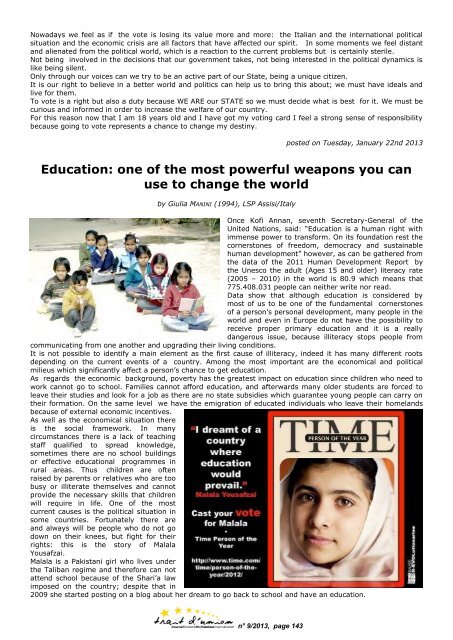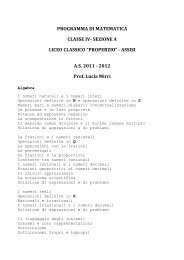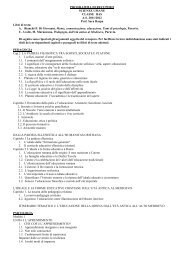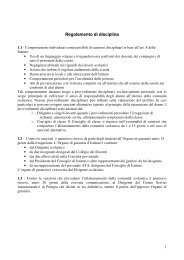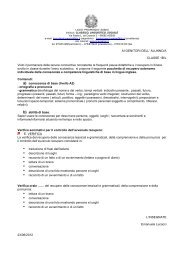The World is Changing - Liceo Sesto Properzio
The World is Changing - Liceo Sesto Properzio
The World is Changing - Liceo Sesto Properzio
Sie wollen auch ein ePaper? Erhöhen Sie die Reichweite Ihrer Titel.
YUMPU macht aus Druck-PDFs automatisch weboptimierte ePaper, die Google liebt.
Nowadays we feel as if the vote <strong>is</strong> losing its value more and more: the Italian and the international politicalsituation and the economic cr<strong>is</strong><strong>is</strong> are all factors that have affected our spirit. In some moments we feel d<strong>is</strong>tantand alienated from the political world, which <strong>is</strong> a reaction to the current problems but <strong>is</strong> certainly sterile.Not being involved in the dec<strong>is</strong>ions that our government takes, not being interested in the political dynamics <strong>is</strong>like being silent.Only through our voices can we try to be an active part of our State, being a unique citizen.It <strong>is</strong> our right to believe in a better world and politics can help us to bring th<strong>is</strong> about; we must have ideals andlive for them.To vote <strong>is</strong> a right but also a duty because WE ARE our STATE so we must decide what <strong>is</strong> best for it. We must becurious and informed in order to increase the welfare of our country.For th<strong>is</strong> reason now that I am 18 years old and I have got my voting card I feel a strong sense of responsibilitybecause going to vote represents a chance to change my destiny.posted on Tuesday, January 22nd 2013Education: one of the most powerful weapons you canuse to change the worldby Giulia MANINI (1994), LSP Ass<strong>is</strong>i/ItalyOnce Kofi Annan, seventh Secretary-General of theUnited Nations, said: “Education <strong>is</strong> a human right withimmense power to transform. On its foundation rest thecornerstones of freedom, democracy and sustainablehuman development” however, as can be gathered fromthe data of the 2011 Human Development Report bythe Unesco the adult (Ages 15 and older) literacy rate(2005 – 2010) in the world <strong>is</strong> 80.9 which means that775.408.031 people can neither write nor read.Data show that although education <strong>is</strong> considered bymost of us to be one of the fundamental cornerstonesof a person’s personal development, many people in theworld and even in Europe do not have the possibility toreceive proper primary education and it <strong>is</strong> a reallydangerous <strong>is</strong>sue, because illiteracy stops people fromcommunicating from one another and upgrading their living conditions.It <strong>is</strong> not possible to identify a main element as the first cause of illiteracy, indeed it has many different rootsdepending on the current events of a country. Among the most important are the economical and politicalmilieus which significantly affect a person’s chance to get education.As regards the economic background, poverty has the greatest impact on education since children who need towork cannot go to school. Families cannot afford education, and afterwards many older students are forced toleave their studies and look for a job as there are no state subsidies which guarantee young people can carry ontheir formation. On the same level we have the emigration of educated individuals who leave their homelandsbecause of external economic incentives.As well as the economical situation there<strong>is</strong> the social framework. In manycircumstances there <strong>is</strong> a lack of teachingstaff qualified to spread knowledge,sometimes there are no school buildingsor effective educational programmes inrural areas. Thus children are oftenra<strong>is</strong>ed by parents or relatives who are toobusy or illiterate themselves and cannotprovide the necessary skills that childrenwill require in life. One of the mostcurrent causes <strong>is</strong> the political situation insome countries. Fortunately there areand always will be people who do not godown on their knees, but fight for theirrights: th<strong>is</strong> <strong>is</strong> the story of MalalaYousafzai.Malala <strong>is</strong> a Pak<strong>is</strong>tani girl who lives underthe Taliban regime and therefore can notattend school because of the Shari’a lawimposed on the country; despite that in2009 she started posting on a blog about her dream to go back to school and have an education.n° 9/2013, page 143


